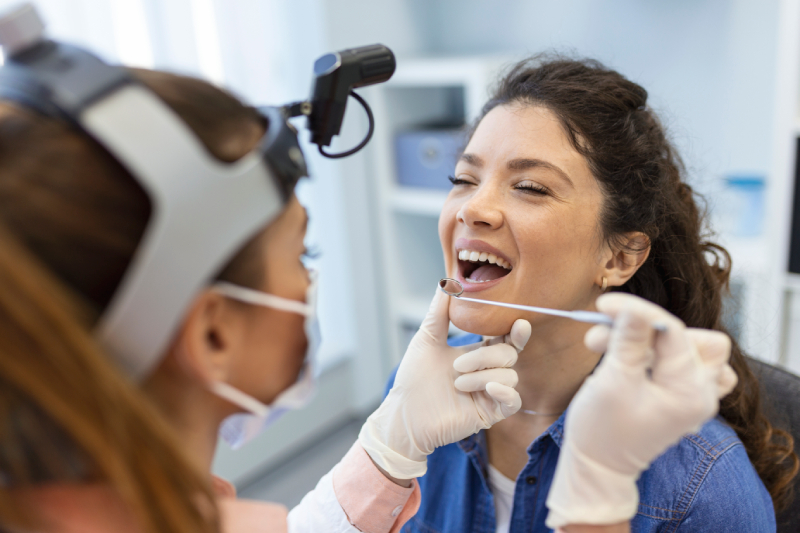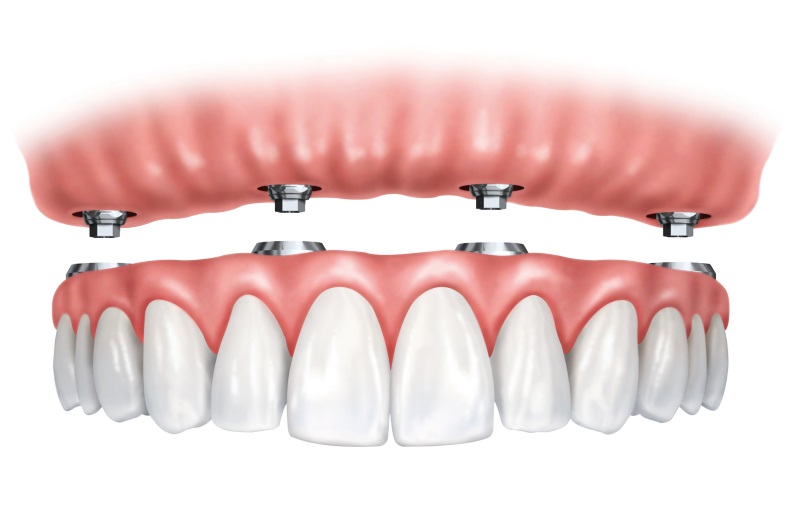- 214-308-5359
- Mon – Fri: 9:00 AM – 5:00 PM
- 5444 FM 423 Ste 600, Frisco, TX 75036

It’s definitely not easy to live without our natural teeth. It’s even harder if you have removable dentures since they have the tendency to fall off. Plus, if you neglect to clean or soak them in water, they’ll shrink and won’t fit well, which means you’ll need to get yourself another set of removable dentures.
Even if you put much effort in taking care of your dentures, the reality is that they will never feel and function in the same way as our natural teeth do.
So what can you do?
You can choose to get implant supported permanent dentures. Our clinic offers full mouth rehabilitation services using this kind of dental solution. We’ll do our best to give you a new set of teeth that looks and feels like your natural ones. Click here to learn more about this treatment option.
The All-on-4 (or 5, 6, 7, 8) refers to titanium metal screws or posts that are surgically installed into the patient’s jawbone (under the gums). These will serve as the base where your new teeth will be placed. Once they’ve fully healed, the dentist can now mount your new teeth on top of them.
The All-on-4 fixed prosthesis is the best option for permanently replacing missing teeth – up to eight teeth in each jaw. What’s great about this alternative dental solution is that it’s not necessary for the patient to have new roots for each missing tooth. Simply put, the patient is no longer required to get a full replacement.
Instead, a minimum of four roots is enough to support a complete set of dentures. However, the patient can still get their permanent restorations placed on four to eight new roots in each jaw depending on their case. Once installed, this full mouth prosthesis will look, feel and function almost like their natural teeth. With this, the patient is now able to eat and communicate naturally without any limitations.

With the installation of their new permanent prosthesis, the patient can get an all-on-four, all-on-five, all-on-six, or an all-on-eight artificial root attached on each jaw. These will provide support to either a removable or a fixed set of dentures. Normally, the all-on-four fixed prostheses are commonly used. This kind consists of two new roots that are placed in front of the patient’s jaw, while the remaining two will be placed in the back of the jaw at a 45° angle.
For cases where additional support and retention of the prosthesis is required, your dentist may opt to use 6 or 8 implants instead. However, this practice is rarely used, because this means the patient will need to have a thicker and greater volume of jaw bones in order to support the enhanced number of titanium screws.

In general, patients who’re looking to replace their missing teeth using dental implants are qualified for getting any kind of prostheses. Fixed dentures provide the perfect solution for the following cases:
patients who’d like to get full mouth rehabilitation of their upper or lower jaw will be advised to acquire permanent multiple tooth prostheses to support their dentures. The dentist will provide their patients with a complete set of replacement teeth using gorgeous restorations.
permanent dentures are ideal for patients who’d like to have a perfect smile. It’s the best oral restoration alternative for missing teeth.
unfortunately, traditional implants can’t be installed in your mouth if your jawbone isn’t thick enough to support them. To solve this problem, the dentist will provide their patients with a complete mouth reconstruction using a full mouth prosthesis. This method is much better than other kinds of tooth replacement options. Patients under this category are advised to get a bone graft for conventional implants or consider acquiring mini dental restorations to replace their missing teeth in the upper and/or lower jaw.
The creation and installation (placement) of the All on 4 (or 5, 6, 7 and 8) are carried out in two phases: (1) involves the placement procedure (2) involves the loading in the patient’s jaw using the right prosthesis.
First, the dentist will make sure that their patient feels numb and pain-free after administering local anesthesia. However, if their patient is feeling extremely anxious or worried, their dentist may opt to use conscious sedation. Once the patient is ready, the dentist will now start the surgical procedure by making an incision over the soft tissue that’s overlying the jaw bone where the new roots need to be inserted. Then, a surgical flap will be raised, and a small hole will be drilled in the patient’s jaw where they will be placed. Next, the titanium roots are then screwed into position with careful precision.
traditionally, a complete prosthesis would be fixed to the new roots using an abutment as soon as the area has fully healed after the surgery. However, thanks to modern technological advancements in dentistry, dentists are now able to load them immediately using the correct prosthesis. In this case, the dentures and their abutments will be prepared beforehand. After the surgery has been completed, they will be inserted immediately into the patient’s jaw.
Undoubtedly, fixed prostheses have a couple of advantages compared to traditional alternatives like dentures and bridges. Below are 5 major benefits:
fixed prostheses are strong, durable and comfortable. Combined with the aesthetic appeal of fixed or removable partial dentures, patients will feel more satisfied and confident with their replacement teeth. In addition, they’ll be able to eat and speak naturally like they used to. Plus, thanks to these artificial roots, their new teeth will have a stable foundation that will support their new teeth.
unlike traditional alternatives that requires a few months before a prosthesis can be installed, the All-on-4 (or 5, 6, 7, 8) prosthesis can be instantly loaded together with the patient’s new teeth. This means patients will no longer need to wait for several months before getting the result that they want – having a perfect smile.
fixed prostheses are incredibly durable as compared to traditional dentures, which need to be repaired or replaced frequently. They would last even longer if you maintain good oral hygiene (brush regularly, floss, and rinse) and eat healthy.
Generally speaking, your dentist will make sure to perform as minimal surgery as possible and since permanent restorations only need four artificial roots (in most cases), the recovery time is much faster and the procedure is made easier for the patient.
In case of a fixed prosthesis, bone grafting is no longer required because they can be installed where the quality and quantity of bone is less pronounced. Normally, the effects of bone resorption are very minimal, especially in the front portion of the jaw bone. This means the two new roots in front are stable, and are capable of retaining the prosthesis. Meanwhile, the remaining two screws or posts are placed at the back of the jaw at a 45° angle. Overall, a fixed prosthesis can be installed in cases where there is lesser space available between the upper and lower jaw bone than usual. Furthermore, your dentist can even use mini-implants to provide the same benefits in certain cases.
The All-on-4 or All on 4 (or 5, 6, 7, 8) dental implants will provide our patients with the best and most beautiful smile that people will be envious about. Interested in getting these? Don’t hesitate to visit us in Frisco, TX and make an appointment with us today. We are located in the greater DFW Texas, which is just minutes away from The Colony and Prosper.



Dr. Gadhiya Dental Affiliations
Dr. Gadhiya is highly educated and experienced in providing dental care. He provides the dental care you and your family need to reach healthy smiles. Read more about our Team.
At Highland Oak Dental, our vision is to establish a trusted dental practice renowned for exceptional care, rooted in quality, compassion, and a comprehensive approach.